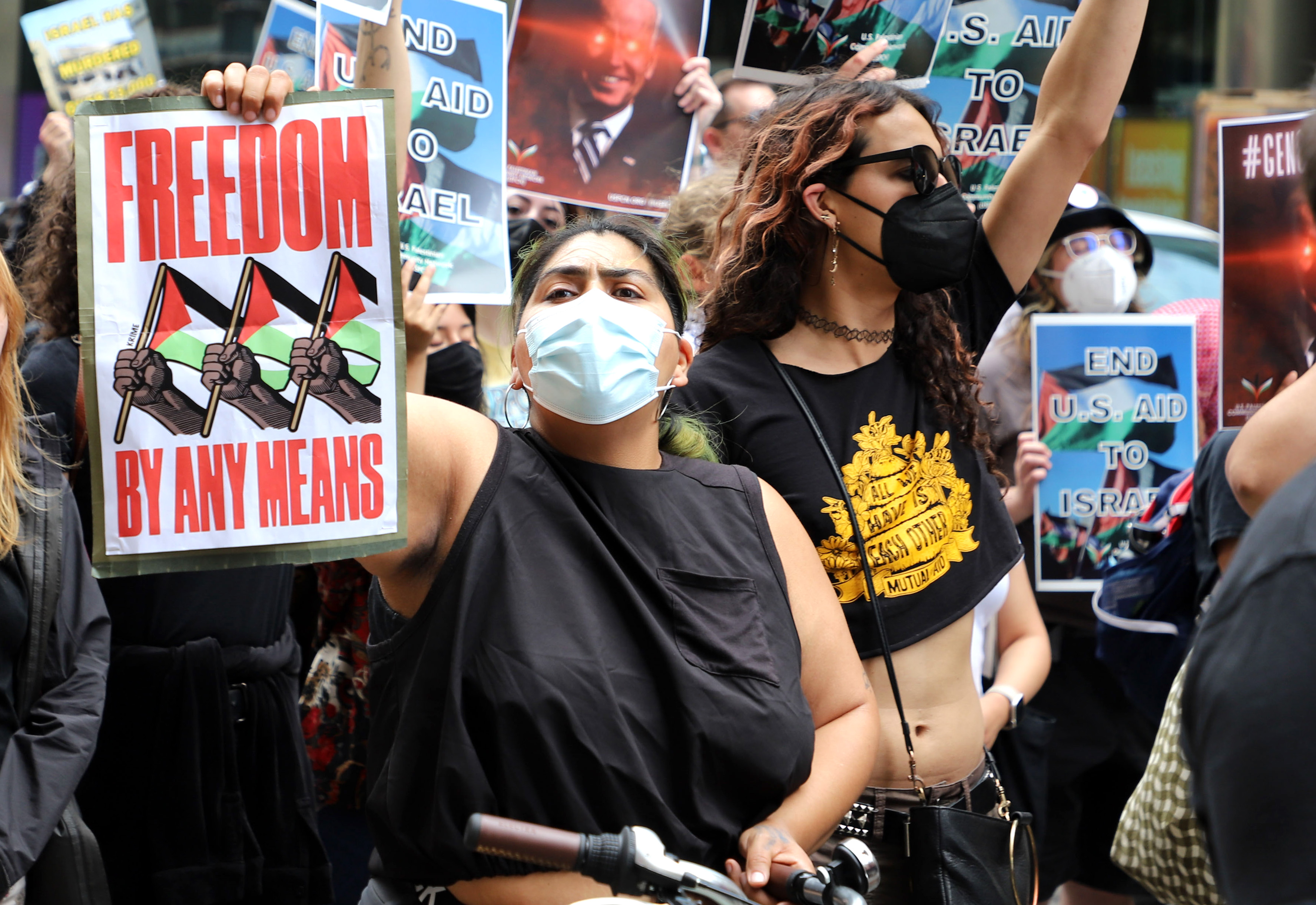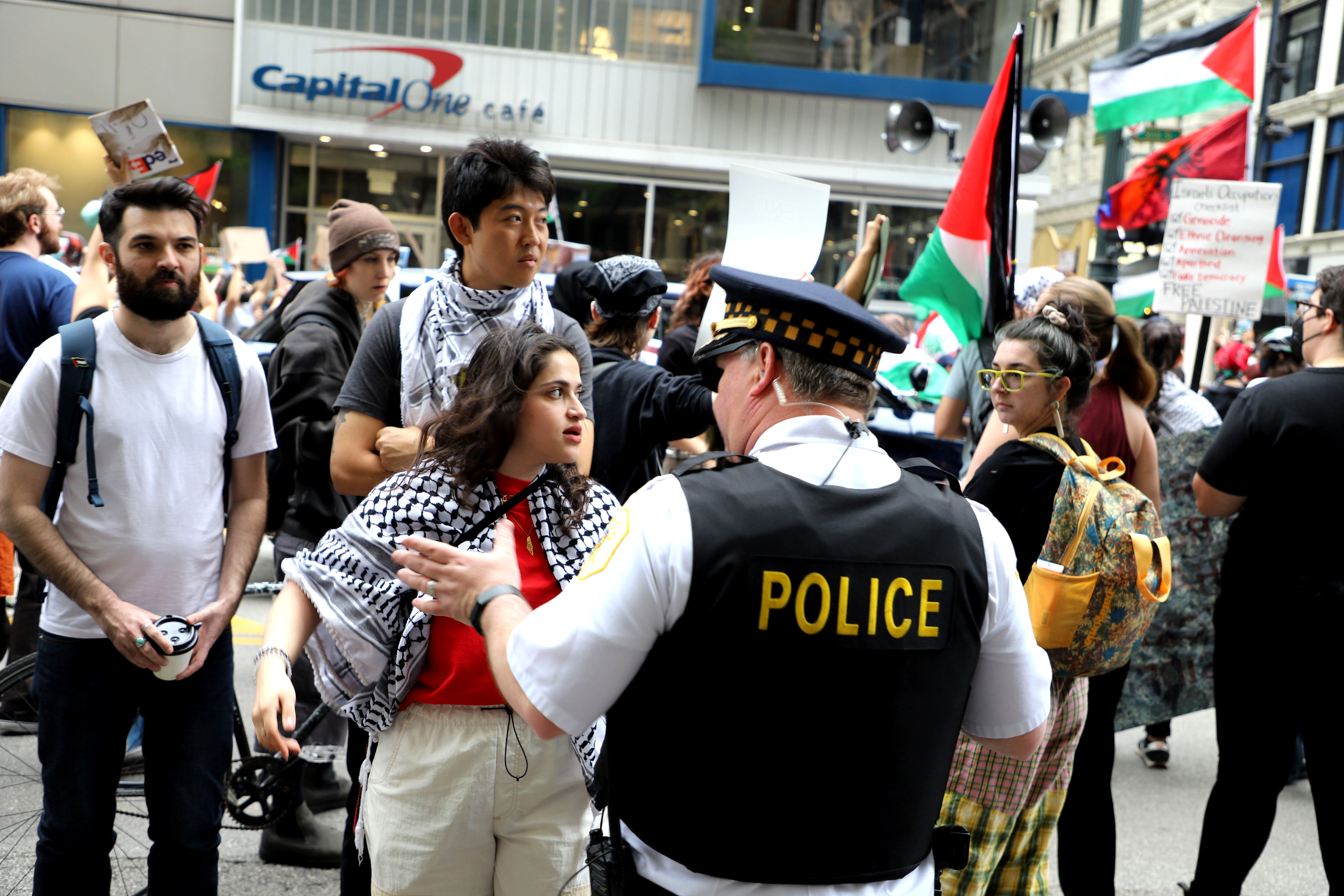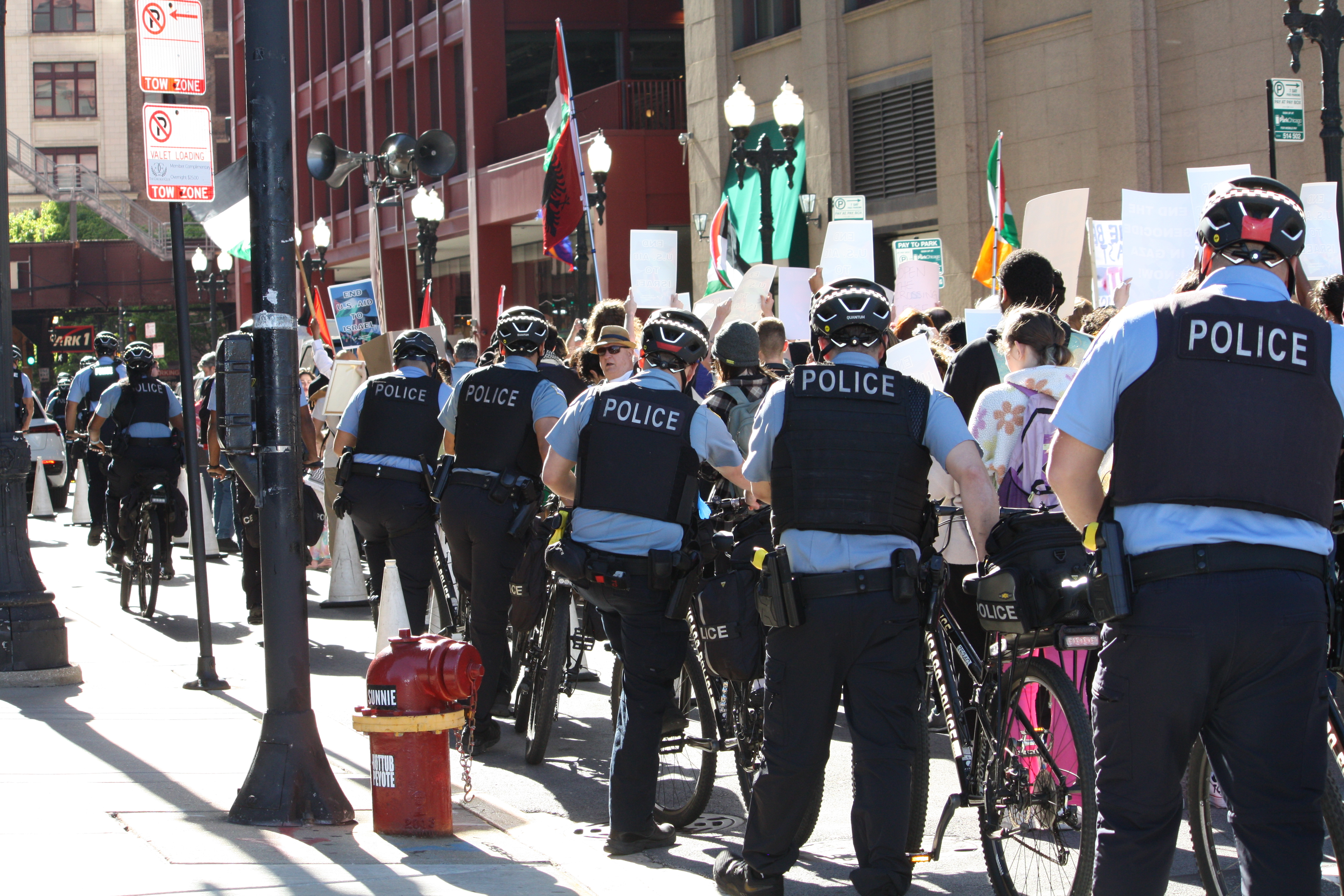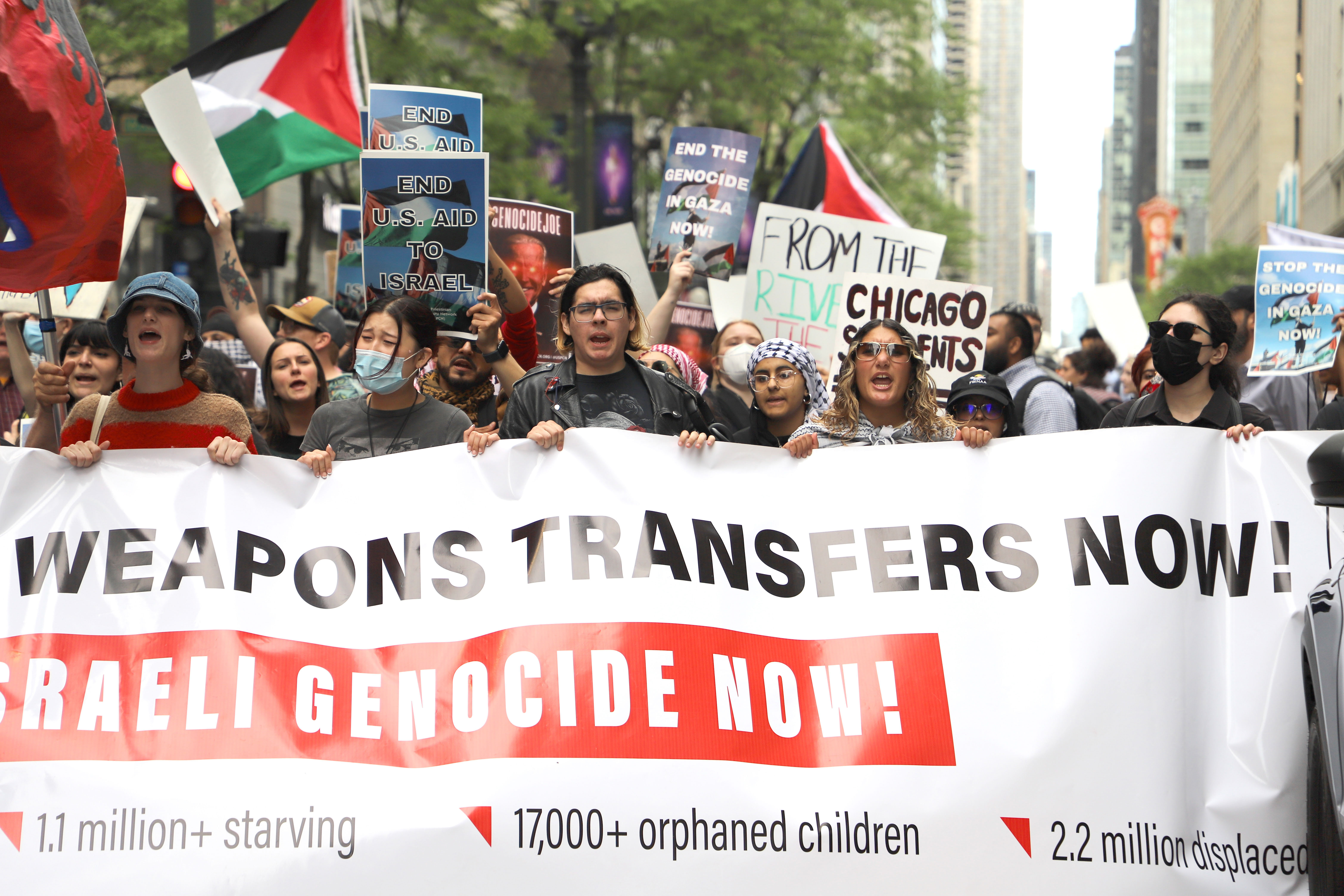Biden faces pro-Palestinian protesters in Chicago during fundraiser.
As tensions increase between pro-Palestinian protesters and President Joe Biden, the outcome of this year’s presidential election becomes more unpredictable.
On Wednesday, May 8, protesters gathered at Michigan and Ida B. Wells at 4:30 p.m. to protest Biden’s aid to Israel. According to Jonathan Masters and Will Merrow at The Council on Foreign Relations, “The United States has provisionally agreed (via a memorandum of understanding) to provide Israel with nearly $4 billion a year through 2028.”
When Biden attended the fundraiser at the Palmer House Hilton, protesters gathered near Monroe and State around 5 p.m. As the protesters made their way, police barricaded the doors to the Palmer House Hilton so that no one could enter during Biden’s visit.

Police line up in front of the Palmer House Hilton on Wednesday, May 8, 2024. Photo by Sam Freeman.
The protesters, led by the Chicago Coalition for Justice in Palestine, marched with signs that read “Genocide Joe” and “End U.S. Aid to Israel.” Protesters shouted, “Joe Biden took a side, he supports a genocide” and, “The taxes that you just filed are going to Israel in the billions, so get up and take a stand, we’re taking back our land.”
Nick, a protestor who was not part of the Chicago Coalition for Justice in Palestine, said he had “no faith in American legislation” and he felt there was no good choice in the presidential election.
“You got on one hand, a fascist, on the other hand, genocide,” Nick said. “What’s the choice? My principles don’t go that cheap.”

Pro-Palestinian protesters march in opposition to U.S. aid to Israel on State Street on Wednesday, May 8, 2024. Photo by Gia Clarke.
Many of the criticisms of Biden’s foreign policies pertaining to Israel aid have already presented themselves in the primaries. In Michigan, 13 percent of primary voters cast their ballot for “uncommitted.” As conflict progresses in the Middle East, dissatisfaction among pro-Palestinian protesters deepens.
When asked if she would be voting for Biden in November, Valerie, a mom protesting with her daughter, said “No, blood is on his hands,” and there is nothing he can do to regain her support.
Another protester calls for the destruction of the two-party system. The protester, who asked to remain anonymous, said: “I anticipate the future not to be a two-party system. I don’t want any fascist. I don’t want a two-party system. We’re gonna have to work to change that.”
Scott Hibbard, the Chair of the Political Science Department at DePaul, said he hopes Biden’s aid to Israel does not cost him the election, but “it very well may.”
“There’s a handful of swing states, Michigan being one of them, with a very strong Arab population, and they’re entirely alienated by the Biden policies,” Hibbard said, “Honestly, if I was a Palestinian in Dearborn, Michigan, I’m not sure if I’d feel comfortable voting for Joe Biden.”
The New York Times/The Philadelphia Inquirer/Siena College polls conducted from April 28 to May 9 found that former President Donald Trump, the Republican candidate, led Biden in five of six swing states—including Michigan, where Trump is leading 49% to 42% among registered voters. Surveys connected to the polls show that Israel’s war in Gaza has hurt Biden’s support, especially among young voters.
The history of American involvement with Israel goes back many years. Hibbard, who specializes in Middle Eastern politics and American foreign policy, said Israel is the dominant military power in the region and is the only government in the Middle East with nuclear weapons. Because of this, he said, “our defense establishment is very much intertwined with theirs.”
“We do a lot of intelligence sharing with them. They are an extension of American military power in the region,” Hibbard said.
According to Hibbard, America having ties to Israel is beneficial because the Middle East has “about $30 trillion worth of oil, which is two-thirds of the world’s proven reserves.” Having ties with Israel gives security to the U.S. from Iran, which is a stronger power in the Middle East ever since America removed Saddam Hussein’s regime.
“We see the rise of a pro-Iranian, Shia government in Iraq, and you have a pro-Iranian government in Syria,” Hibbard said. “You see a balance of power shift in the region, and so Iran has been much more assertive.”

A Chicago police officer talks to a pro-Palestinian protester at the Biden protest on State Street on Wednesday, May 8, 2024. Photo by Gia Clarke.
Journalism professor Chris Bury says people will need to take a close look at both candidates before voting in November.
“You have former President Trump who has instituted a Muslim ban, and said he would immediately deport any non-Americans on campus who are protesting for Palestine,” said Bury. “And you have Joe Biden, who is in an incredibly difficult position, because obviously, he didn’t start the war, Hamas started the war, and Israel responded in a way which killed many civilians.”
In 2017, Trump implemented a 90-day travel ban from seven predominantly Muslim countries. Last week, at a rally in New Jersey, Trump said he would “immediately deport” pro-Palestinian protesters on college campuses.
Donald Trump’s history of anti-Muslim bigotry goes back to his campaign in 2015, when he falsely claimed that “thousands and thousands” of Muslims cheered in New Jersey when the World Trade Center collapsed on September 11, 2001. He also demanded surveillance of American Muslims and mosques and retweeted three anti-Muslim propaganda videos.
Another Pro-Palestinian protester, Daisy, acknowledges Trump’s past treatment of Muslims, stating the current Israel-Gaza conflict could have been made even worse under his direction.
“I honestly don’t know what he would do when he was in this position. I would assume he would be just the same as Biden, or even worse,” said Daisy.
When faced with a binary decision, many pro-Palestinian supporters are choosing not to vote for either candidate.

Police monitor the perimeter as protesters march down State Street. Photo by Sam Freeman.
“It’s not so much that they won’t vote for Trump, it’s so much as they won’t vote,” Hibbard said.
Hibbard believes a Democratic administration would be more responsive to the people than a Trump administration due to Project 2025, which is a plan to replace civil servants and a large majority of the American federal administration with solely conservatives.
“At the end of the day, there are a lot of issues that people are concerned about: there’s abortion rights, there’s immigration, there’s Israel,” Hibbard said. “Those are all secondary to the big question of, ‘Are we going to have a functional democracy a year from now?’”
In the Middle East, Israel seized the Rafah border crossing between Egypt and Gaza, cutting off humanitarian aid. Israel also warned more than 100,000 Palestinians to evacuate the city, even after aid groups said there was no place left in Gaza with the infrastructure to support that many people.
Last week, Biden said he would halt U.S. shipment of offensive military weapons to Israel if they proceed with a ground invasion of Rafah. He also said the U.S. would continue to provide Israel with defensive weapons to protect itself from attacks, such as the missile attack by Iran last month.
“It’s just wrong. We’re not going to — we’re not going to supply the weapons and artillery shells used,” Biden told CNN. “I’ve made it clear to Bibi and the war cabinet — they’re not going to get our support, if in fact they go on these population centers.” Bibi is the nickname for Israeli Prime Minister Benjamin Netanyahu.
The House passed a bill on Thursday to send arms shipments to Israel. According to ABC News, however, “the bill is not likely to advance in the Senate.” Senate Majority Leader Chuck Schumer said he won’t bring it to the floor for a vote, and Biden announced he would veto it if brought to him.
In the meantime, Biden faces criticism from the Speaker of the House Mike Johnson and other Republicans in Congress, who said they “turned their back on Israel.”
“It’s kind of a lose-lose situation. There’s nothing [Biden] can do that’s going to appeal to all sides,” Hibbard said.
Header photo by Gia Clarke




NO COMMENT